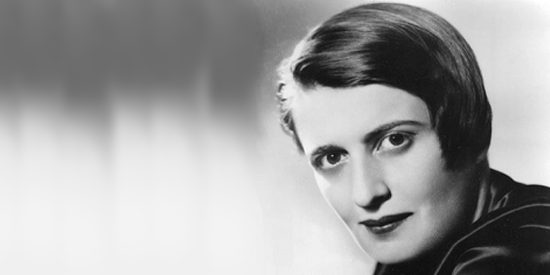I don’t pretend to know much about Ayn Rand. Of course, I’ve heard a lot about her, and I’ve read a few bits and pieces, but I’m certainly not an expert. And then recently while I was procrastinating on Facebook I came across an article about her titled Ayn Rand, Worst Aunt Ever. The friend who had posted the article seemed to agree with that sentiment, as did many others, but as I read through the article my disquiet grew.
Here’s a summary. Ayn Rand has a niece, Connie, who is 17 and wants to buy a dress. So she writes to her aunt, an aunt she doesn’t seem to have a relationship with, and asks to borrow $25 to buy a dress. The letter tells us she promises to get a job and repay the money. And her aunt responds by agreeing to lend her the money, but on the following conditions: she gives her a year in total to repay the debt. She gives her six months’ grace in which to find a job, after which the repayments occur over six months, and she doesn’t even charge any interest.
She also lays out very clearly why she has structured it like that – she wants Connie to understand that borrowing money is a business transaction and should be taken very seriously. There are no excuses – when you borrow money, there are repayment conditions and you have to honour them.
Worst aunt ever? I think not. I don’t find the letter dour or stern, as the writer of the article does. I find it honest and straightforward, and quite kind, actually.
I think those of us who have children would do well to follow Ayn Rand’s example and assess what we are teaching our children about money. Because they will incur debt one day to buy a house or a car, and they need to understand that loans come with terms and repayment plans. If you don’t honour them, the bank doesn’t care about your excuses. And they’ll be a lot less polite than Ayn Rand was to her niece.
When I was a teenager, I got a small amount of pocket money, but I was expected to buy my own toiletries. My parents bought things like soap, shampoo and toilet paper, but I was expected to buy my own deodorant, body lotion and make-up, etc. I also had to fund my own entertainment like movie tickets and records. (Yes, I’m that old.)
I remember my boyfriend at the time thinking that was utterly ridiculous, but it taught me a valuable lesson. I learnt to compare quantities and prices. To decide whether I wanted to repel the world via my body odour and have the latest music, or adhere to basic standards of hygiene and have friends. To work out how many times I could afford to go to the movies every month, and whether I really needed a large popcorn at inflated cinema prices. And the principles I learnt there have stood me in good stead over the years.
I think we do our children a disservice when we buy them everything they want: when their first car is a brand new Mini paid for by Daddy and they never have to save up for the things they want. An enterprising child will earn some money for themselves: run a lemonade or pancake stand, bake biscuits, wash cars, babysit or sell things at craft markets.
The world is a scary place when it comes to money. I’d rather my kids learnt how to work with it at home, on a small scale, where they have parents as a back-up resource, so that they learn good financial management principles they can apply to bigger amounts when they have a job one day.
So I admire Ayn Rand for that letter. It’s a letter grounded in reality, and I hope her niece realised how lucky she was.

Leave a Reply